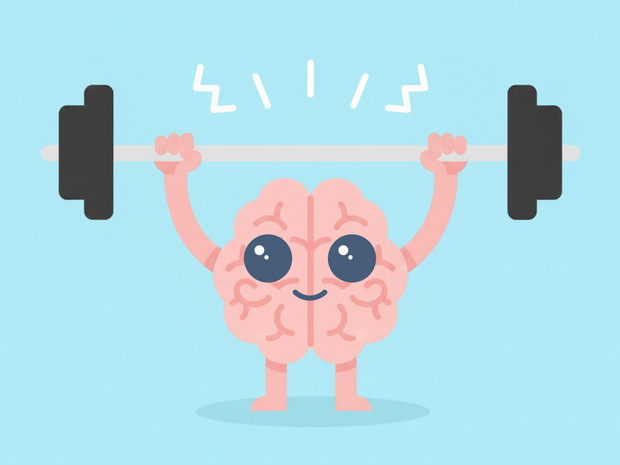It’s the day before an exam, and you need that one last productive study session to be totally prepared. So, being the diligent learner that you are, you lay out the textbooks, notes, and open your flashcard study app … and suddenly you feel exhausted.
Of course, your body and brain fail you now, of all times. How do you shake off the mental cobwebs? Down a Red Bull? Have a triple-shot mocha iced coffee? Pop an Adderall?
Wrong. Wrong. Definitely wrong.
The answer is exercise. Exercise and studying go hand-in-hand.
It sounds counterintuitive to move when you’re tired (especially when those energy drinks promise you a set of wings) but physical exercise can give you the burst of energy you need to study.
Being the most popular flashcards app with millions of users over the past decade, Brainscape has amassed libraries of quantitative and qualitative data from users who say that they are more focused when studying after (or even during!) a workout. Moreover, they tend to remember the content better.
Exercise helps optimize your brain for study.
The far-reaching benefits of physical movement not only boost your learning but also your body and mentality. It’s no coincidence that many high-achieving humans—Madonna to casually name a favorite—have made exercise a daily habit.
But can physical exercise work out your brain?
Absolutely: there’s not a sliver of doubt. Science supports that the best way to keep your mind and body in top shape is to be physically active. Even a single workout with weights can immediately enhance long-term memory by around 20%.
In this article, we’re sharing:
- How does physical exercise work out my brain?
- 4 Powerful brain benefits of exercise
- 4 Tips for working out during exam time
- Exercise is the best way to boost brain power
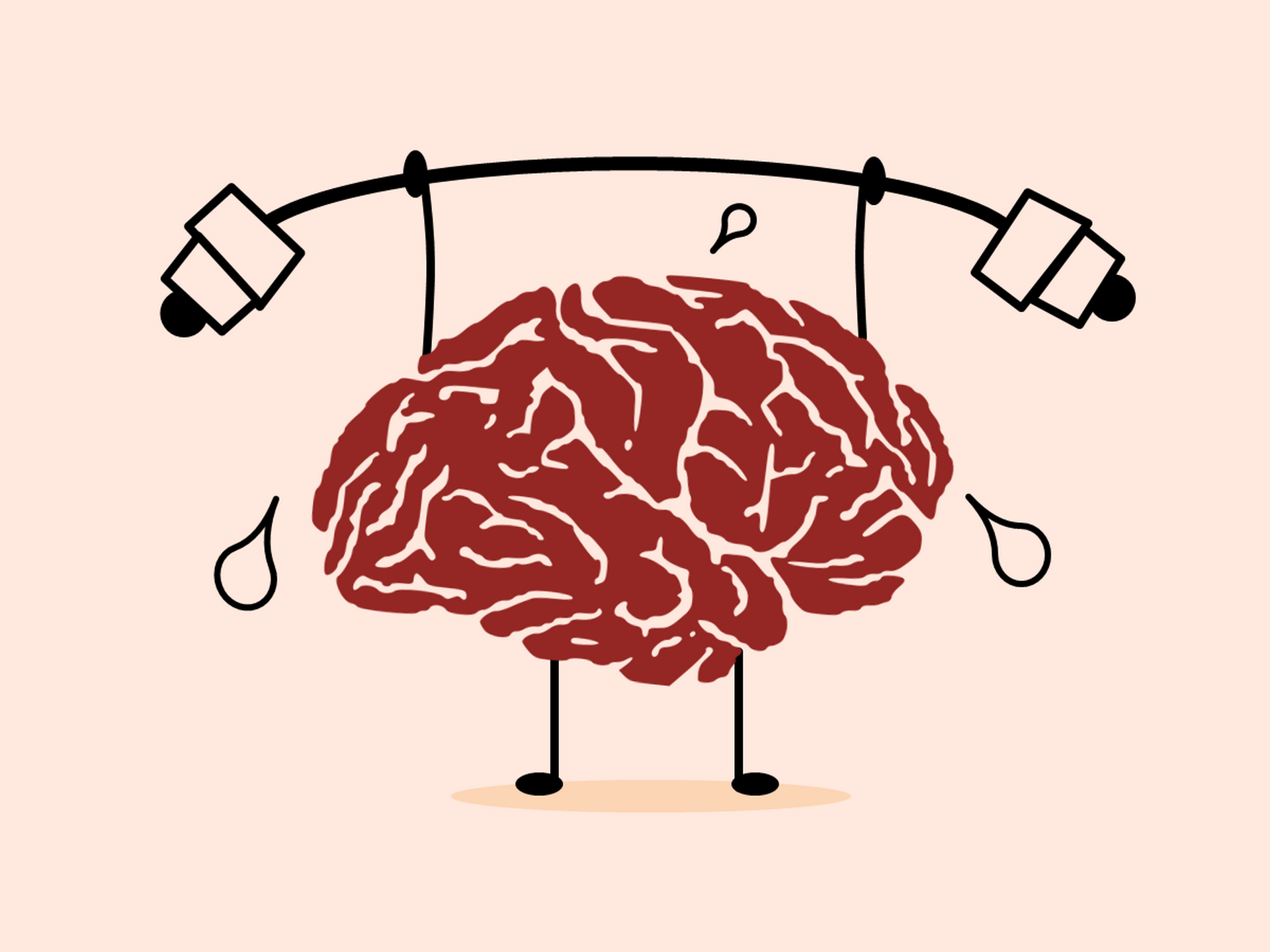
1. How does physical exercise work out my brain?
Your brain is your body’s command center and it requires a steady feed of energy in the form of glucose and oxygen to function efficiently.
When you exercise, your body’s oxygen requirements skyrockets. Consequently, your blood, the transporter of oxygen, nutrients, and glucose, is pumped more vigorously to all regions of the body, including the brain. And with the increased oxygen and energy, your brain receives the wake-up call it needs to function better.
People report feeling more relaxed and energized after exercising even though they expend energy.
Here are four other powerful brain benefits of exercise, according to the extensive medical literature:
2. 4 Powerful brain benefits of exercise
Although there are many benefits of exercise, we're focusing on these four because they impact your ability to study effectively:
- Better cognitive functioning
- Stronger immune system
- Improved mental health
- Better quality of life
Let's take a deeper dive into each benefit to learn more about the relationship between exercise and studying.
Benefit 1. Exercise improves cognitive functioning

Fedewa and Ahn conducted a meta-analysis of 59 studies (from 1947 to 2009) and found significant correlations between physical activity and enhanced cognition. Two of are especially relevant to dedicated learners:
Exercise boosts long-term memory
In a 2014 study, Weinberg and his colleagues showed a series of pictures to two groups of people, not specifying that they should memorize them. Afterward, the first group did resistance training, while the other did not. What they found was that the participants who exercised identified 10% more photos, two days later, than those who didn’t, indicating that short amounts of resistance training can improve long-term memory.
Exercise flexes your brain
Did you know that your brain can grow and change? “Synaptic plasticity” is fancy science-speak for our neurons’ ability to change shape and establish new pathways in response to changes in behavior. Aerobic exercise increases blood flow to the brain, which can increase brain volume and improve the plasticity and longevity of your neurons.
Why is this important? Without neuroplasticity, learning new information, languages, or skills would be next to impossible!
Benefit 2. Exercise improves your immune system

The only thing worse than arriving for an exam feeling unprepared is feeling sick. And, for everyone else in the exam room, there’s nothing quite as disruptive as someone hacking, coughing, and blasting germs into the air. Damnit, Steve ... leave your phlegm at home next time, will ya?
In addition to cognitive benefits, regular exercise also improves overall health. I’m not just talking about being well enough to perform at exams; it’s also about living a long and healthy life.
The Journal of Sport and Health Science found that acute exercise strengthens your immune system: your body’s best line of defense against harmful bacteria and viruses that can lead to infection and disease. If your body is a castle, your immune system is the crocodile-riddled moat (with a marksman in one of the turrets bearing an uncanny resemblance to Bruce Willis).
It’s really the regular movement, as demonstrated by Campbell and Turner in 2018, that improves blood circulation, whole-body oxygenation and nutrition, muscle tone, elimination of toxins, and sleep. Think about it this way: say you have a housekeeper come to clean your house, the more frequently the housekeeper comes, the cleaner the house will stay.
It’s the same with exercise. Don’t expect to have an illness-clearing immune system if you do some jumping jacks a few times a year. Instead, coming back for regular movement better supports this sensitive, complex, and crucial regulatory system. This, in turn, improves your body’s resistance to pathogens, infection, and toxins, while also helping you keep a sexy figure.
Benefit 3. Exercise improves your mental health

We know that exercise is great for your body and learning abilities. But it’s also effective in dealing with stress and anxiety.
While marrying someone obscenely rich and running away from all of life’s problems and responsibilities is one way out, exercise is a simpler, yet surprisingly effective way of beating back stress and gaining a healthy mental perspective.
Lower risk of anxiety and depression
Exercise is actually a wonderful (adjunctive) therapy for treating mild to moderate depression. A study conducted by Harvard T.H. Chan School of Public Health found that walking for an hour, or even going for a 15-minute run, reduces the risk of major depression by 26%. This is just one of a plethora of studies and meta-analyses showing that regular exercise can be linked to a reduction in anxiety, depression, and post-traumatic stress disorder.
If you’re feeling particularly anxious, go for a walk or run and focus on the sensation of your feet hitting the ground. Shift your attention to your breath, heartbeat, the sound of the birds around you, or the wind on your face. In other words: take your attention off the dizzying number of tasks and problems on your plate and return your mind to equilibrium.
Improve your mood
There’s an enormous sense of well-being associated with exercise because it promotes the body’s secretion of endorphins. Endorphins are the body’s natural “feel good” neurotransmitters that kick in after about 20 minutes of training.
Endorphins are our body’s natural pain relief and are often compared to opioid pain relievers. Although the results are less dramatic, regular production of these endorphins leaves us feeling more energized, helps us sleep better, and improves mental health over the long term.
If you're also looking for ways to reduce your stress, check out Brainscape’s article on how to use stress to actually improve your performance.
Benefit 4. Exercise improves your quality of life

We’ve discussed the positive cognitive, physical, and mental effects of regular exercise but we’re far from done. Exercise also improves your overall quality of life. What does that look like?
Exercise increases energy
Your brain uses up a whopping 20% of your body’s oxygen—and that’s just for all its standard, automated functions. If you’re in full study mode, engaging your full mental faculties, you’ll need even more oxygen than usual to fuel your brain and body.
Exercise can do this by:
- Increasing oxygen to the brain through increased blood circulation.
- Increasing the production of endorphins, which are the chemicals that produce feelings of well-being.
- Improving the quality of your sleep by keeping your body’s circadian rhythm in tune.
- Promoting relaxation by taking your mind off stress (see Benefit 3).
- Training the heart to work more efficiently.
An early morning workout may not seem like much of an energizer now but as you build workouts into your routine, you’ll be better equipped, mentally and physically, for anything thrown your way.
Exercise improves sex life
Oh, so now I’ve got your attention! With more energy, a good mood, and a sexy body you want to show off, your likelihood of wanting to score in the sack increases. And seriously, is there any better way to release study stress?
(By the way, if you're really into fitness and are considering becoming a certified personal trainer, check out our ultimate study guide to the NASM.)
3. 4 Tips for working out during exam time

We’ve just put exercise on a pretty high pedestal with those four colossal benefits. The only problem now is finding the necessary time. As if you didn’t already have enough on your plate, now you’ve got to somehow squeeze in an hour of cardio?
I know it can seem like a huge ask, but the fact of the matter is that exercise plays a vital role in keeping you healthy, happy, and mentally sharp. So, rather than seeing it as a chore, see it as a study boost: something that can give you the leg up on the competition.
Here are four tips for finding time to exercise during exam time:
Tip 1. Slip in a workout before OR after studying
Leverage a brain health boost by going for a run/walk/cycle/swim before or after a study session. According to Dr. John J. Ratey’s research, exercise prepares the brain to learn new information and it makes retaining the information easier.
There are also benefits to exercising after studying. In an article on exercise and brain health by the New York Times, Dr. Eelco van Dongen, said:
“Long-term memory is not only influenced by what happens when you learn new things, but also by the processes that take place in the hours and days afterward, when new information is stabilized and integrated in your brain.”
Exercising a few hours after studying increases the production of biochemicals in the body and brain that are related to mental function. Why this happens isn’t yet understood. But if it works, why argue with it?
Tip 2. Combine exercise and studying
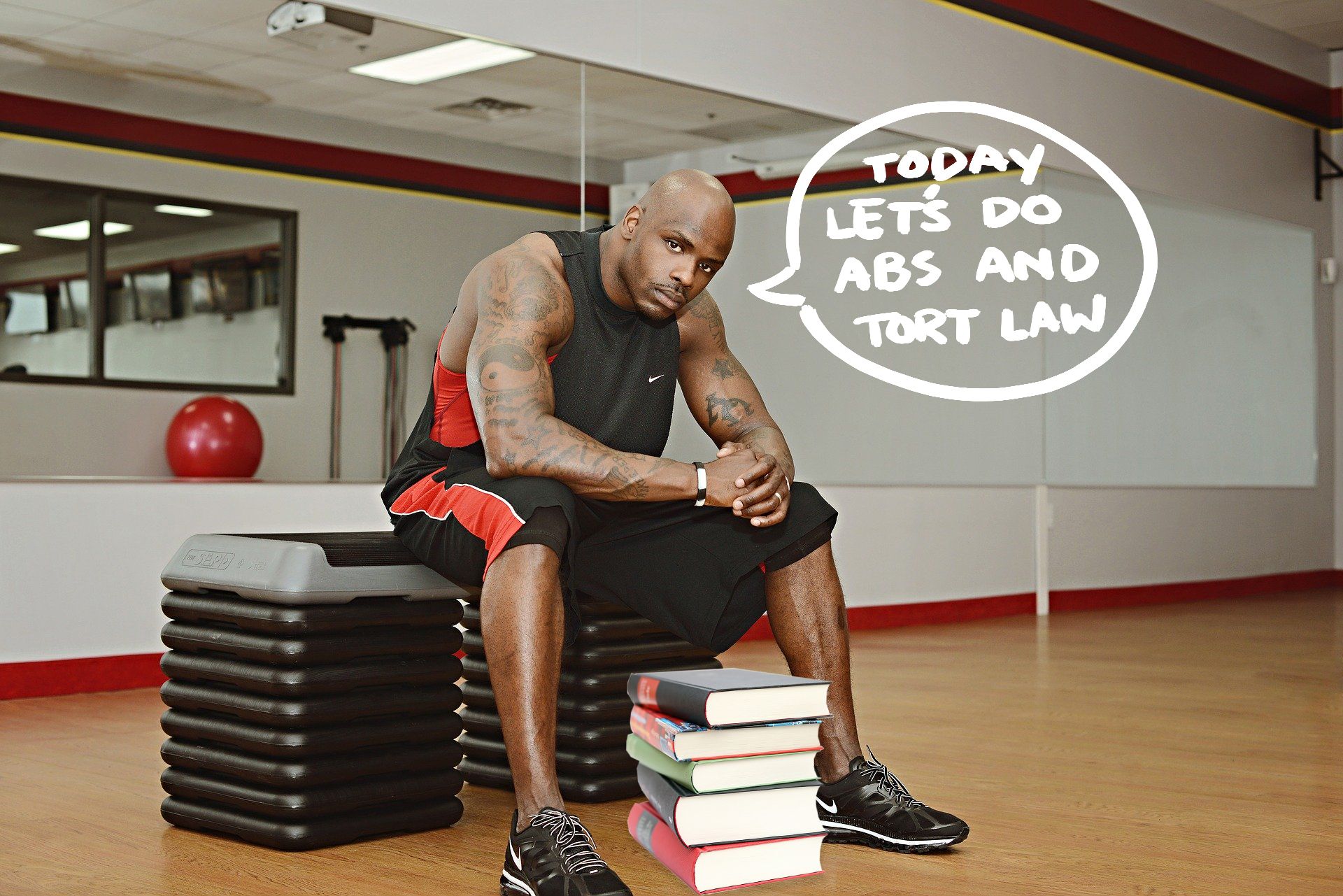
We often feel like there aren’t enough hours in the day. It often results in choosing one of our priorities and leaving others to gather dust. So, why not combine both exercise and studying?
- If you’re heading out for a run or even lifting weights in the gym, try listening to study notes, recorded lectures, YouTube videos, or podcasts. You can even record yourself speaking your most important notes to make it relevant and interesting. And if you’re studying for the multistate bar exam, check out Brainscape’s MBE audio series for hands-free studying. There are more audio courses coming so stay tuned!
- Read your notes while you do light activities such as walking on a treadmill. Or spread your notes out on your desk and do squats or wall sits as you read. These two options get the blood flowing while you’re studying.
- You could also employ the Feynman technique during moderate activities such as walking or between sets by pretending to explain your toughest concept in its simplest terms to a toddler. It’s one of the best ways to test whether you’ve really understood your materials.
Check out our Brainscape article on studying while exercising for more super helpful tips on how to kill these two important birds with one stone.
Tip 3. Use Brainscape for super efficient studying
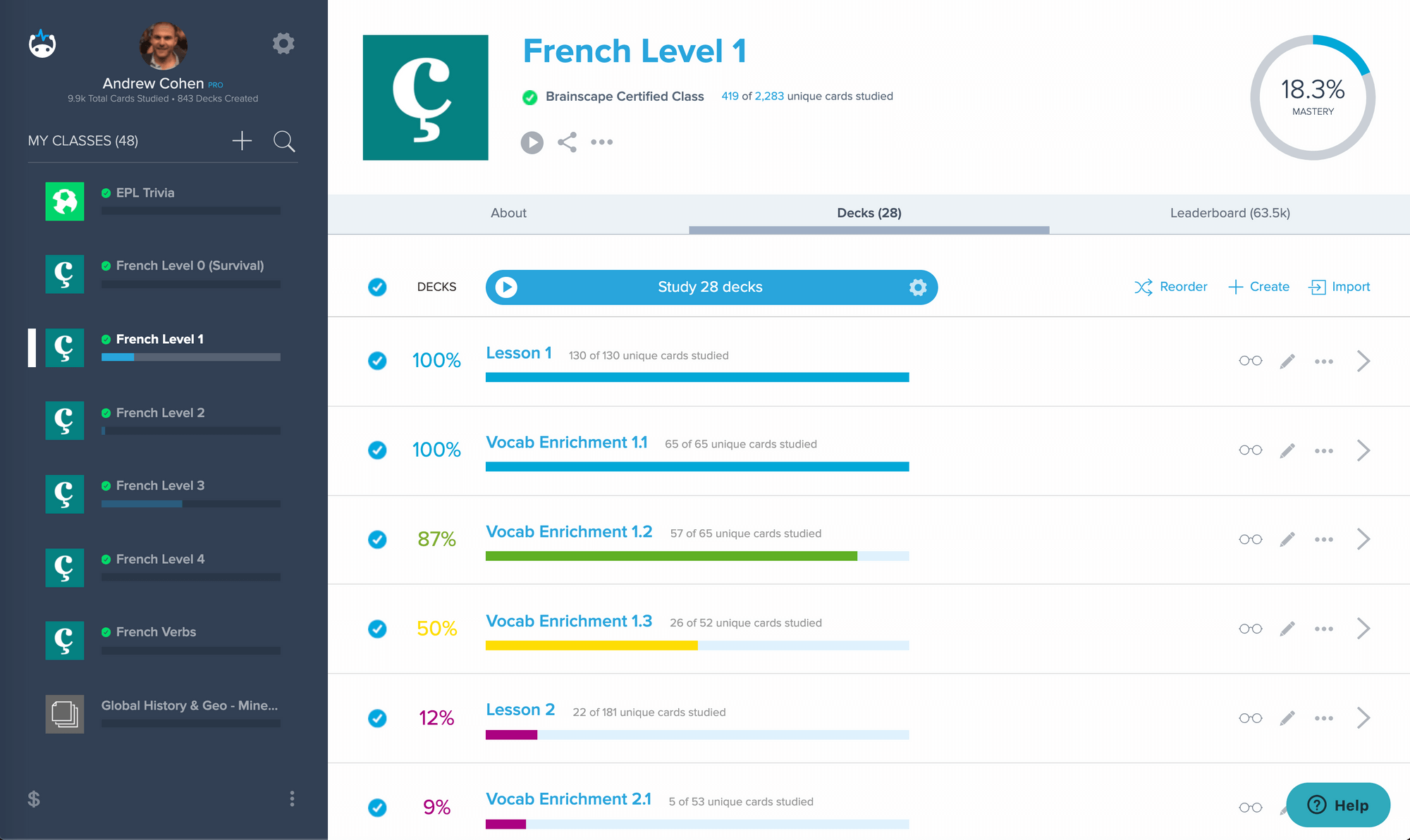
Brainscape’s adaptive flashcard learning platform and spaced repetition algorithm have been tailored to the individual to help optimize their studying. Here are three ways our platform can help you save time on your exam preparation so that you have more time for exercise!
- Brainscape helps you prepare study materials ahead of time. Make flashcards in your spare time or find top-rated flashcards made by Brainscape’s other users or by our partner subject matter experts.
- Brainscape makes it easy to read flashcards during your workout. To work through your flashcards, simply whip out your device during a workout. Each study session is delivered in short packs of 10 flashcards, which can take you minutes to do. This makes it easy to study in short bursts between sets or to keep you occupied on the treadmill, stationary bike, etc.
- Streamlines your study process for you. Our algorithm ensures that the concepts you find difficult are shown more often than those you’re comfortable with. This optimized repetition system helps to transfer concepts to long-term memory far more efficiently, saving you time on learning.
Tip 4. Wake up earlier

Waking up just one hour earlier gives you a whole hour extra to get your day off to an incredibly energized start. So why not do it? Go to bed an hour earlier if you’re concerned about sleep.
To get into the habit, try doing it gradually. Start 10-15 minutes early for 2 to 4 days until you’re used to it. Then get up another 10-15 minutes earlier. Do this until you have a whole hour extra to dedicate to an early morning exercise session.
Pro Tip: if you have a habit of turning off your alarm and going back to sleep, try putting it somewhere out of reach so that you’ll actually have to get out of bed to turn it off.
4. Exercise is the best way to boost brain power
Exercise boosts brainpower by generating more oxygen for the brain. It mitigates illnesses both for exams and our lifetimes. It improves mental health and helps us take a well-deserved break from worrying. It also elevates our general sense of well-being by kickstarting ‘happy’ endorphins and gives us the energy to get through any challenges, including heavy study sessions.
There are many problems that exercise can fix but it takes time, effort, and dedication. A healthy lifestyle is a commitment you make every day for the rest of your life: kind of like marriage ... but one that you definitely don’t want to end in a divorce!
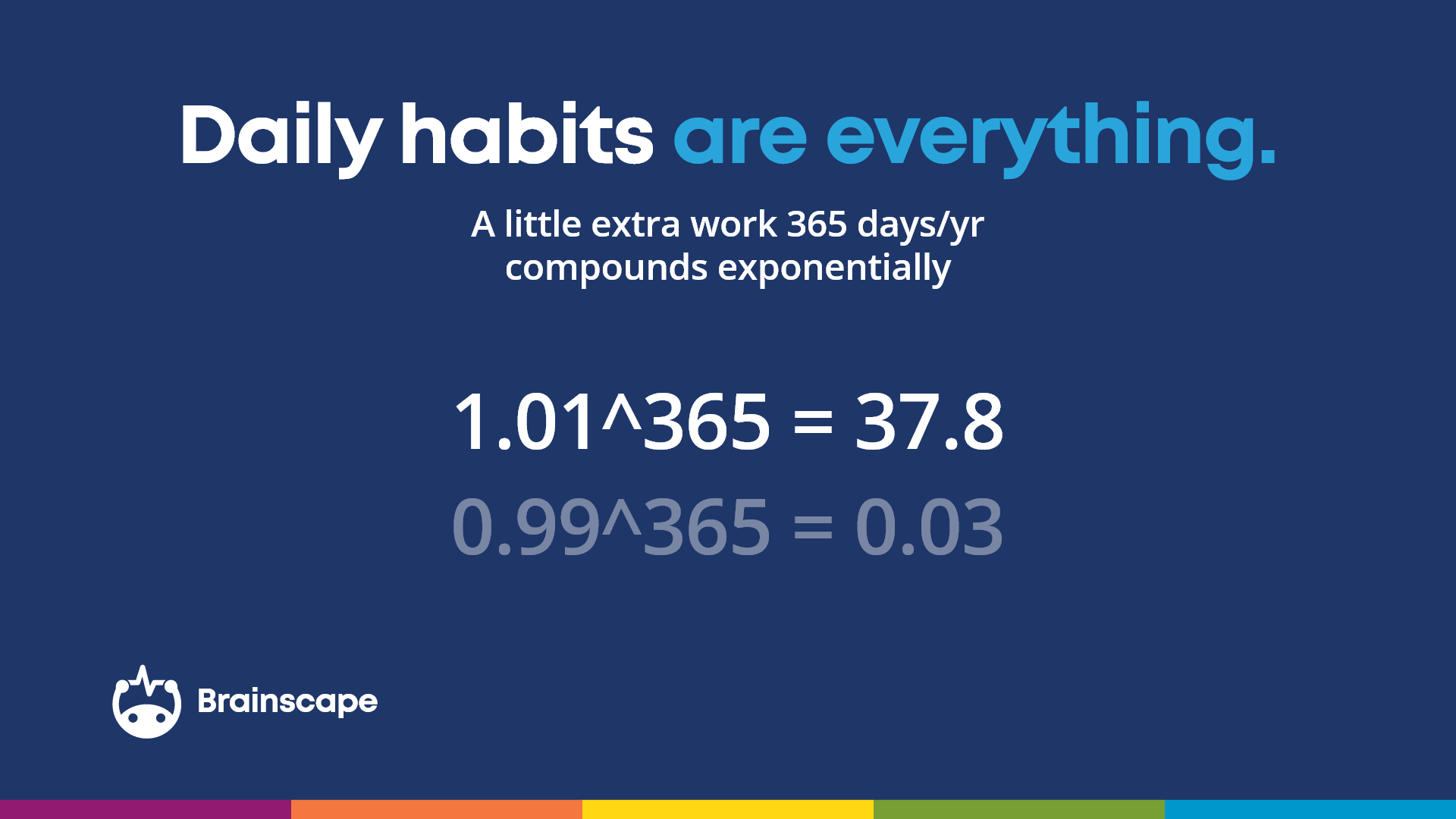
But, with so many positive physical and mental health benefits to exercising, students would be remiss if they didn’t leverage its potential to improve brain power, particularly during exam time!
And be sure to check out our article on optimizing your brain and body for studying for a deeper dive into all this fun stuff.
Sources
Ahn, S., & Fedewa, A. L. (2011). A meta-analysis of the relationship between children’s physical activity and mental health. Journal of Pediatric Psychology, 36(4), 385-397. https://dx.doi.org/10.1093/jpepsy/jsq107
Campbell, J. P., & Turner, J. E. (2018). Debunking the myth of exercise-induced immune suppression: Redefining the impact of exercise on immunological health across the lifespan. Frontiers in Immunology, 9, 648. https://dx.doi.org/10.3389%2Ffimmu.2018.00648
Fedewa, A. L. & Ahn, S. (2011). The effects of physical activity and physical fitness on children's achievement and cognitive outcomes: A meta-analysis. Research Quarterly for Exercise and Sport, 82(3), 521-535. https://doi.org/10.1080/02701367.2011.10599785
Nieman, D. C. & Wentz, L. M. (2019). The compelling link between physical activity and the body's defense system. Journal of Sport and Health Science, 8(3), 201-217. https://doi.org/10.1016/j.jshs.2018.09.009
Ratey, J. J. (2008). Spark: The revolutionary new science of exercise and the brain. Little, Brown Spark.
Weinberg, L., Hasni, A., Shinohara, M., & Duarte, A. (2014). A single bout of resistance exercise can enhance episodic memory performance. Acta Psychologica, 153, 13-19. https://doi.org/10.1016/j.actpsy.2014.06.011
